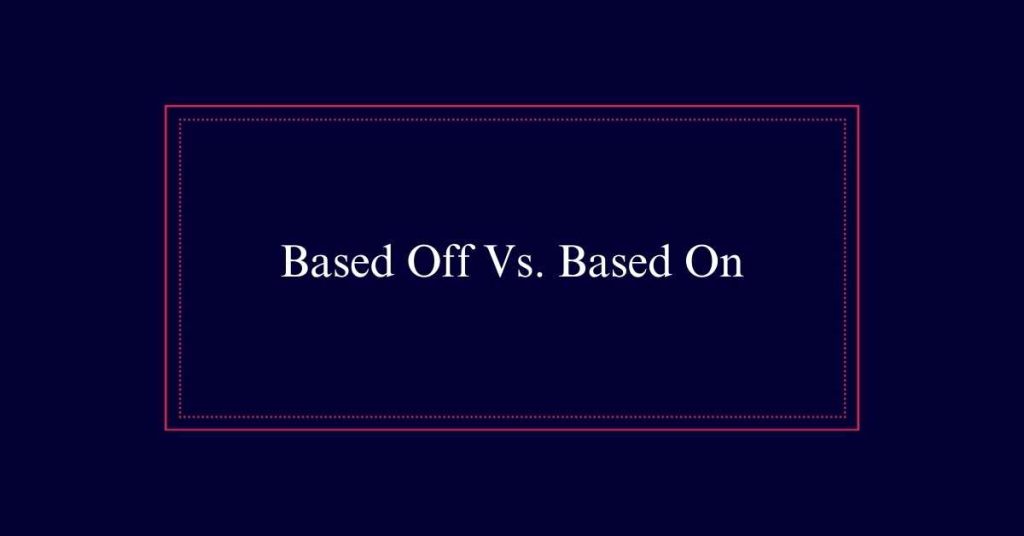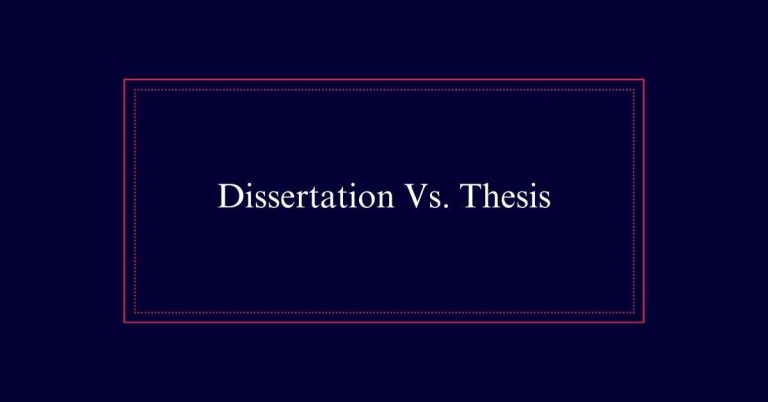Based Off Vs. Based On
The difference between “based off” and “based on” lies in formality and regional usage. “Based on” is preferred in academic and British English for its clarity and formality. It indicates that something is derived from another source and is widely accepted in professional writing. “Based off,” more common in American English, is informal and suggests a mix of fact and fiction. It is generally inappropriate for formal writing but is often used in casual speech.
Understanding “Based On”
Based on is a phrase used to indicate that something has its foundation in a fact, opinion, or event. It is commonly used in academic writing and British English.
The adjective ‘based’ describes a noun that has its roots in another source. For example, a movie can be based on a true story, showing a close relationship between the film and the actual events. This phrase implies that the content rests upon a solid foundation.
In writing, using ‘based on’ provides clarity and formality. It accurately conveys that something is derived from or supported by another element, ensuring a clear and precise connection between the two entities.
Understanding “Based Off Of”
In American English, ‘based off of’ is often used to indicate that something is derived from a particular source, blending elements of fact and fiction. This phrase is grammatically correct, though some argue it implies a more casual tone.
The usage of ‘based off of’ can be summarized as follows:
- Interchangeable: It can be used interchangeably with ‘based on’ in informal contexts.
- Casual Tone: It is more common in spoken American English, offering a relaxed, conversational style.
- Implication: It suggests a mix of fact and fiction, making it suitable for creative projects.
Usage in Academic Writing
Academic writing favors the use of ‘based on’ due to its formal tone and clarity. This preference guarantees that the relationship between the source material and the derived content is clearly understood. ‘Based on’ is straightforward and unambiguous, making it ideal for scholarly work where precision is paramount.
Using ‘based on’ also aligns with academic standards and conventions, which prioritize clarity and formality. Conversely, ‘based off’ or ‘based off of’ are seen as too informal and can lead to misunderstandings.

To maintain a professional tone and adhere to academic norms, scholars and students should consistently use ‘based on’ in their writing. This practice enhances the credibility and readability of academic documents.
Usage in British English
British English typically favors the use of ‘based on’ in both formal and informal contexts. This preference aligns with traditional grammatical standards and guarantees clarity in communication.
- Formal Writing: In academic papers, official reports, and professional documents, ‘based on’ is the preferred choice. It maintains a formal tone and clear meaning.
- Informal Writing: Even in casual writing, such as emails or personal blogs, ‘based on’ is more common. It avoids any potential confusion that might arise from using ‘based off.’
- Spoken Language: In everyday conversation, British speakers also tend to use ‘based on.’ This consistency across different modes of communication helps in maintaining uniformity and understanding.
Usage in American English
American English exhibits a more flexible approach to the usage of ‘based on’ and ‘based off of.’ While ‘based on’ remains the standard in formal writing, ‘based off of’ is increasingly accepted in casual speech and informal contexts.
This flexibility is reflective of American English’s evolving nature and its tendency to incorporate colloquial expressions. For instance, in everyday conversation, one might say, “The movie is based off of a book,” without raising eyebrows. However, in academic or professional settings, ‘based on’ is preferred for its clarity and precision.
Despite their interchangeable use in speech, careful writers should note the context to make sure their language remains appropriate for the audience and purpose.
Popularity in Writing
In writing, ‘based on’ is overwhelmingly more popular than ‘based off of’. This preference is evident in various forms of written communication, including academic papers, articles, and formal documents.
The reasons for this popularity can be summarized as follows:
- Clarity: ‘Based on’ provides a clear and direct relationship between the basis and the subject.
- Formal Tone: It conveys a more professional tone, which is suitable for formal writing.
- Wider Acceptance: ‘Based on’ is widely accepted in both American and British English, making it versatile.
Formal Vs. Informal Contexts
While ‘based on’ is preferred in writing for its clarity and formal tone, the choice between ‘based on’ and ‘based off of’ often depends on the context in which they are used.
‘Based on’ is the standard in formal contexts such as academic papers, business communications, and professional reports. It conveys a precise relationship between the subject and its source.
Conversely, ‘based off of’ is more common in informal settings, particularly in spoken American English. It is often used in casual conversations, social media, and informal writing.
Though both phrases are understood, selecting the appropriate one enhances the clarity and tone of the communication. Context determines the suitability of each expression.
Examples of “Based On”
A range of examples can illustrate the proper use of ‘based on’ in various contexts. For instance, a movie can be based on a true story, indicating its foundation in real events.
In academic writing, a thesis might be based on extensive research, ensuring it is rooted in verified data.
Similarly, a business plan can be based on market analysis, reflecting its grounding in factual information.
In literature, a novel could be based on historical events, enhancing its realism and depth.
Even in daily tasks, one might write an essay based on a specific topic, ensuring relevance.
Each example underscores the importance of ‘based on’ in creating a connection between the foundation and the derived work.
Examples of “Based Off Of”
In spoken American English, one might say that a dance is based off of an Irish jig, blending cultural elements into a new creation. This phrase is often used to describe something that derives from another source but has distinct modifications.
Here are a few examples:
- Artwork: A painting based off of Van Gogh’s style but with modern elements.
- Literature: A novel based off of historical events but with fictional characters.
- Technology: A new app based off of an existing platform but with enhanced features.







